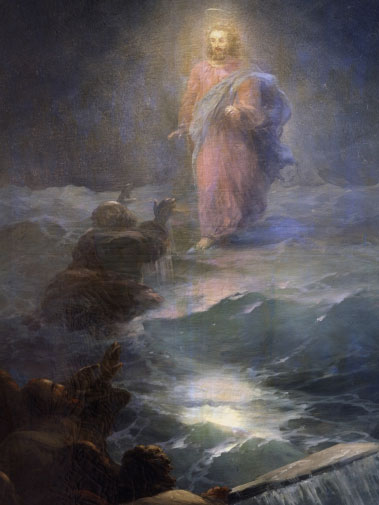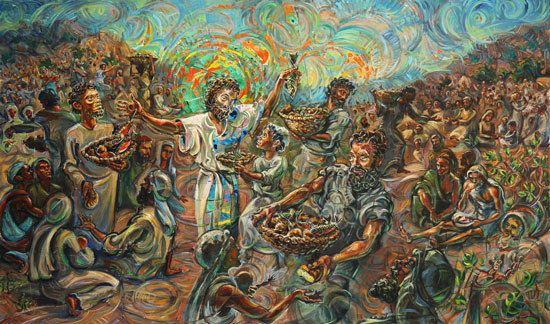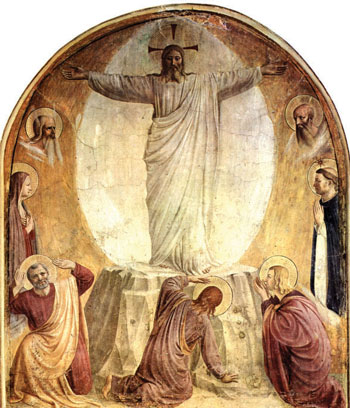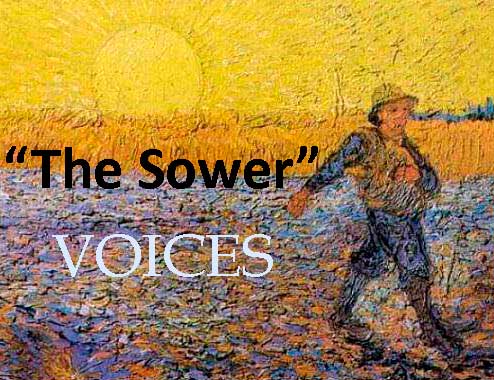I.Theme – Confronting our Fears

"Jesus Walks on Water" – Ivan Aivazovsky (1888)
The lectionary readings are here or individually:
Old Testament – 1 Kings 19:9-18
Psalm – Psalm 85:8-13 Page 708, BCP
Epistle –Romans 10:5-15
Gospel – Matthew 14:22-33
This Sunday’s readings deal with our need for help. This comes in various forms. It may be out of fear; it may be due to bodily danger; it may be a psychological condition.
Our faith may be tested in extreme. Each of the readings has a different form and setting where this occurs.
In all of this we have to remember Jesus call to us. Then it is that we feel his hand reach out to ours. Then it is that we know that the power to take one step more—and perhaps only one step more—is ours for the asking when we call on Jesus. How do we keep our eyes on Jesus when our failures and trials obscure our sight? How often do we feel as if we cannot take the next step? We feel ourselves sinking, sinking in our self-doubt and despair. It is difficult to remember this when our situation close to us cloud our vision.
In the Old Testament, the prophet Elijah was active in the northern kingdom of Israel in the middle of the ninth century BC. He was an opponent of King Ahab and his wife Jezebel, who supported the worship of Baal and other Canaanite fertility gods. Today’s passage follows Elijah’s demonstration that Yahweh is in control of the forces of nature (17:1) and is mightier than Baal (18:20-39). Elijah then flees the vengeance of Jezebel (19:1-3). An angel strengthens him on his journey to Horeb (an alternate name for Sinai).
God’s revelation to Elijah echoes God’s revelation to Moses (Exodus 33:17-23). Like Moses, Elijah receives a revelation and a commission from the Lord. Like Moses, Elijah has gone through conflict with royalty and is fleeing for his life. Like Moses he feels inadequate to the task but is sent back into the fray.
God speaks to the prophet Elijah not in earthquake, wind and fire but in a mysterious silence. This may be an internal communication with him. Elijah thinks that he is already at the limit of his experience and energy, but a “sheer silence” draws him in deeper to the requirements that God has for him.
In the Psalm, this national lament seems to have been composed originally for a particular historical situation of affliction and then to have passed into general use. The original context may have been crop failure before the exile; or more probably, it may have been the difficulties faced by those returning from exile in Babylon. Thanks are given for the return (vv. 1-3), and the lord’s continued help is requested (vv. 4-7). The lord’s answer comes (vv. 8-13), perhaps as an oracle uttered by a temple prophet or priest. Verse 11 reassures the people of God’s gracious care. These four qualities—steadfast love, faithfulness, righteousness, and peace—spring from God and unite to work for the good of God’s people.
The Gospel lesson is the story of Jesus walking on the water. In many of these Gospel stories we know them by the title but there is another secondary story. This is the case with Peter.
The three miracles in this story are: Jesus walking on water, Peter doing the same (and failing ultimately), and the wind ceasing abruptly. Jesus brings comfort from the outside against the elements and faith inside, questioning the disciples own faith and demonstrating by example a deeper faith.
Jesus demonstrates his mastery over wind and sea (which, in the Old Testament, symbolized the powers of chaos and death) and is near to rescue the disciples when they desperately need help. He identifies himself by using the words, “It is I,” which echo God’s own self-description that became the proper name for God in the Old Testament (Exodus 3:14; Isaiah 43:10-13).
This story has many similarities to the narratives of the resurrection appearances; the disciples are afraid, they don’t recognize Jesus, they take him for a ghost, and finally they are reassured by him. Matthew adds the story of Peter’s attempt to imitate Jesus, illustrating the themes of discipleship and faith.
The cause of the fear for the disciples this time is not the storm, but the man walking. There is something expected about waves surrounding a boat. The fact that a man is on the water is not even the source of the fear. The fear comes the unidentified nature of the one walking.
The fear and repulsion are here expressed by the perception of Jesus as a ghost, but they are balanced by his comforting words: “Take heart; it is I; do not be afraid.” The disciples by now know Jesus and trust him, even if their faith remains incomplete. Thus, for him to say “It is I” is to bring the fearful awesomeness of the scene under control by relating it to what is familiar.
Unlike Elijah, Peter wants to think that he is capable of more. Peter asks for and receives a share of Jesus’ power, but when his attention is distracted he begins to give way In the context of fear and apprehension as the disciples see the figure of Christ coming to them on the water, Peter’s brash attempt seems heroic until he realizes that he is caught in the same trap of fear. He suddenly needs a “rescuer” ( Psalm 85) to pick him up and save him for future adventures of faith. Especially in Matthew’s time, the “boat” of the Church, “beaten by the waves” of hostility and persecution, needed reassurance that the Lord was always nearby.
Dietrich Bonhoeffer, the German theologian, writes the following about Peter. “Peter had to leave the ship and risk his life on the sea, in order to learn both his own weakness and the almighty power of his Lord. If Peter had not taken the risk, he would never have learned the meaning of faith… The road to faith passes through obedience to the call of Jesus. Unless a definitive step is demanded, the call vanishes in thin air, and if [people] imagine that they can follow Jesus without taking this step, they are deluding themselves like fanatics.”
In some respects, Matthew’s account is the opposite of the Elijah story. What convinces Elijah does not convince the disciples and Peter, and visa versa. The wind and wave are heady proofs of the danger and their vision of Jesus over coming them seem to be the seed bed of their faith
The Romans reading is less about fear but of faith. You may say that Paul is experiencing a psychological fear. Paul confronted the separation already growing between his beloved Jewish people and his chosen Christian community. Paul wrote this before the expulsion of the Christians from the synagogue—long before the bitter persecution of Jews by Christians began.
In this passage, Paul compares the right relationship to God (“righteousness”) that comes through a strict adherence to the Mosaic law to that which comes by faith. In contrast to a slavish adherence to this law, which is ultimately futile, the righteousness that comes by faith is entirely attainable. It requires no superhuman effort such as ascending into heaven or descending into the abyss. Such feats have already been accomplished by God in Jesus’ incarnation and resurrection.
People need to accept the “word of faith” proclaimed by the apostle. This acceptance is manifested both through inner conviction and outer profession. These signs of faith are rooted in the work of God, affirming that Jesus is God incarnate and that Jesus now lives.
The first of these professions of faith, “Jesus is lord,” was particularly central for the early Church in areas where the people believed in “many gods and many lords” (1 Corinthians 8:5-6). It is the earliest and simplest creed of the Church.
Read more








